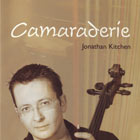 Camaraderie
Camaraderie
23-Oct-2005
Jonathan Kitchen - Cello
Accompanied by Aveley and Newham Band, Ruth Potter, harp; Simon Archer, piano.
KITCH Recordings: 001
Total Playing Time: 60.05
If there were a prize on offer for the most unusual disc featuring a brass band of 2005 then this would surely be a prime contender. We certainly don't know of any other discs featuring solo cello with brass band and if anyone out there does you are more than welcome to let us know!
The recording is an enterprising private release (bearing the catalogue number KITCH001!) by cellist, Jonathan Kitchen and forms a showcase for his clearly considerable talents. A graduate of the Royal College of Music where he won several of the college's major cello prizes, Kitchen subsequently won a place on the London Symphony Orchestra's apprentice scheme where he played under such luminaries as Pierre Boulez, Michael Tilson Thomas and one of the all time great cellists Mstislav Rostropovich.
Three pieces feature the involvement of the Aveley and Newham Band with the rest of the disc being made up of works for solo cello with either piano or harp accompaniment. Quite how Aveley and Newham came to be involved in the project Kitchen does not say in his sleeve notes although he does mention his enthusiasm to hear the Elgar Cello Concerto in the context of the solo part being set against a backdrop of the warm, autumnal tone colours of the brass band.
The arrangement is Kitchen's own and the idea an undeniably interesting experiment. Given the issues of balance which would possibly play their part in a live performance of the arrangement the recording studio seems to be a sensible place to start and in many ways the results offer a good deal to enjoy. Kitchen has performed the 'Elgar Concerto' in the concert hall before and is clearly a passionate advocate of this most melancholic of Elgar masterpieces.
He plays with both pathos and technical security coupled with admirable articulation in the nimble second movement. For the part of the band, things start off fairly well, the rounded sounds of the bass instruments melding well with the rich sounds of the cello. It soon becomes clear however that all is not well with the recording itself. The overall sound of the band suffers from compression with the result that the cornets appear to stick out (and not always flatteringly) like the proverbial sore thumb. It is a pity, for the occasions where it happens mar what otherwise could have been very enjoyable indeed.
The other items featuring the band, 'Be My Love' and 'Riverdance' suffer to a greater or lesser degree in the same way although it is in 'Riverdance' that the problem is at its most noticeable. Here, in louder passages particularly, the band can sound compressed to the point of being muffled and there are serious problems with the recording balance. Once again it is difficult not to let this detract from the quality of the music as a whole. In both of these arrangements Kitchen takes Ray Farr's band transcription and adds his own cello contribution, the cello taking the place of the brass band's cello equivalent the euphonium in 'Be My Love'. It is a substitution that works well and once again Kitchen's playing is a pleasure to listen to.
Given the difficulties the recording engineer seems to have encountered in pairing the sound of the cello with the band we had hoped that the coupling of piano or harp with the soloist would have faired better. Yet here the accompanying instruments are recorded so closely that the instrumental perspective is damaged and there are intrusions in respect of what appear to be mechanical background noises. Fortunately Kitchen's at times ravishing playing draws the listener in and Max Bruch's famous rhapsody on Hebrew themes 'Kol Nidrei' is particularly touching. Indeed, applying the reverse treatment, this famous mainstay of the cello repertoire would work finely for euphonium if anyone were to take up the challenge!
There are several pieces that are again well established favourites for the cello that band enthusiasts will be equally familiar with. 'The Swan' from Saint-Saens' Carnival of the Animals and Massenet's 'Meditation' from 'Thais' probably rank amongst the most famous of these whilst of the lesser known pieces 'Song of the Black Swan' by Brazilian Villa Lobos and Scherzo No. 2 "Les Soirees Intimes" by little known Dutchman Daniel van Goens are particularly pleasing.
What a shame that in the latter the sound engineer manages to spoil things by savagely cutting off the sound reverberation at the end of the track. In the case of Villa Lobos he may sound like a South American footballer drafted into the Premiership but we well remember, as will many of you ardent, anorak clad Granada Band of the Year enthusiasts, Cory's playing Denzil Stephens' arrangement of his 'Little Train of the Brazilian Countryman' at the 1987 contest on the Isle of Man.
Call us old fashioned but after all of this Kitchen's self confessed ruination of Rimsky Korsakov in 'Funk Bumble' seems to sit rather uncomfortably at the end of the disc, although arguably it would feel somewhat uncomfortable wherever it was placed. Alongside Kitchen's cello, electric piano, harpsichord, bass guitar and percussion however there are some great sounds from Aveley and Newham's bass trombonist Andrew Austin.
Chris Thomas
What's on this CD?
1. Cello Concerto in E Minor op.85 (1st & 2nd Movs), Elgar, 12.24
2. Piece en forme de Habenera, Ravel, 3.15
3. Beau Soir, Debussy, 2.35
4. Elegie, Milhaud, 4.26
5. Be My Love, Brodsky/Cahn, 3.12
6. Kol Nidrei, Bruch, 11.00
7. The Swan, Saint- Saens, 2.48
8. Song of the Black Swan, Villa Lobos, 3.08
9. Scherzo No 2 Les Soirees Intimes, Daniel van Goens, 3.27
10. Meditation from Thais, Massenet, 5.18
11. Riverdance, Bill Whelan, 6.14
12. Funk Bumble, Korsakov ruined by J. Kitchen, 2.14
Total Playing Time: 60.05









